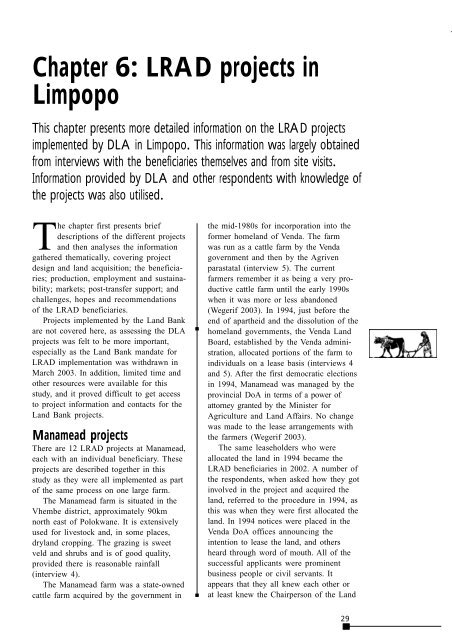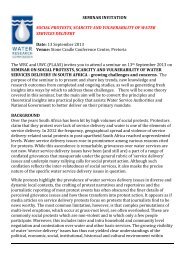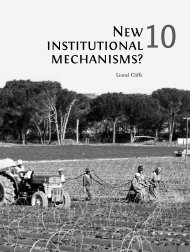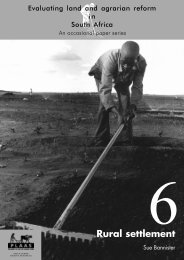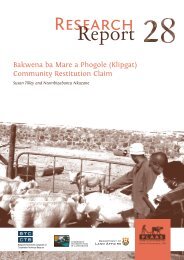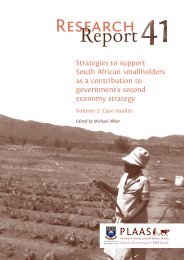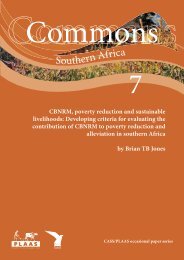A critical appraisal of South Africa's market-based land reform policy
A critical appraisal of South Africa's market-based land reform policy
A critical appraisal of South Africa's market-based land reform policy
Create successful ePaper yourself
Turn your PDF publications into a flip-book with our unique Google optimized e-Paper software.
Chapter 6: LRAD projects in<br />
Limpopo<br />
This chapter presents more detailed information on the LRAD projects<br />
implemented by DLA in Limpopo. This information was largely obtained<br />
from interviews with the beneficiaries themselves and from site visits.<br />
Information provided by DLA and other respondents with knowledge <strong>of</strong><br />
the projects was also utilised.<br />
The chapter first presents brief<br />
descriptions <strong>of</strong> the different projects<br />
and then analyses the information<br />
gathered thematically, covering project<br />
design and <strong>land</strong> acquisition; the beneficiaries;<br />
production, employment and sustainability;<br />
<strong>market</strong>s; post-transfer support; and<br />
challenges, hopes and recommendations<br />
<strong>of</strong> the LRAD beneficiaries.<br />
Projects implemented by the Land Bank<br />
are not covered here, as assessing the DLA<br />
projects was felt to be more important,<br />
especially as the Land Bank mandate for<br />
LRAD implementation was withdrawn in<br />
March 2003. In addition, limited time and<br />
other resources were available for this<br />
study, and it proved difficult to get access<br />
to project information and contacts for the<br />
Land Bank projects.<br />
Manamead projects<br />
There are 12 LRAD projects at Manamead,<br />
each with an individual beneficiary. These<br />
projects are described together in this<br />
study as they were all implemented as part<br />
<strong>of</strong> the same process on one large farm.<br />
The Manamead farm is situated in the<br />
Vhembe district, approximately 90km<br />
north east <strong>of</strong> Polokwane. It is extensively<br />
used for livestock and, in some places,<br />
dry<strong>land</strong> cropping. The grazing is sweet<br />
veld and shrubs and is <strong>of</strong> good quality,<br />
provided there is reasonable rainfall<br />
(interview 4).<br />
The Manamead farm was a state-owned<br />
cattle farm acquired by the government in<br />
the mid-1980s for incorporation into the<br />
former home<strong>land</strong> <strong>of</strong> Venda. The farm<br />
was run as a cattle farm by the Venda<br />
government and then by the Agriven<br />
parastatal (interview 5). The current<br />
farmers remember it as being a very productive<br />
cattle farm until the early 1990s<br />
when it was more or less abandoned<br />
(Wegerif 2003). In 1994, just before the<br />
end <strong>of</strong> apartheid and the dissolution <strong>of</strong> the<br />
home<strong>land</strong> governments, the Venda Land<br />
Board, established by the Venda administration,<br />
allocated portions <strong>of</strong> the farm to<br />
individuals on a lease basis (interviews 4<br />
and 5). After the first democratic elections<br />
in 1994, Manamead was managed by the<br />
provincial DoA in terms <strong>of</strong> a power <strong>of</strong><br />
attorney granted by the Minister for<br />
Agriculture and Land Affairs. No change<br />
was made to the lease arrangements with<br />
the farmers (Wegerif 2003).<br />
The same leaseholders who were<br />
allocated the <strong>land</strong> in 1994 became the<br />
LRAD beneficiaries in 2002. A number <strong>of</strong><br />
the respondents, when asked how they got<br />
involved in the project and acquired the<br />
<strong>land</strong>, referred to the procedure in 1994, as<br />
this was when they were first allocated the<br />
<strong>land</strong>. In 1994 notices were placed in the<br />
Venda DoA <strong>of</strong>fices announcing the<br />
intention to lease the <strong>land</strong>, and others<br />
heard through word <strong>of</strong> mouth. All <strong>of</strong> the<br />
successful applicants were prominent<br />
business people or civil servants. It<br />
appears that they all knew each other or<br />
at least knew the Chairperson <strong>of</strong> the Land<br />
29


